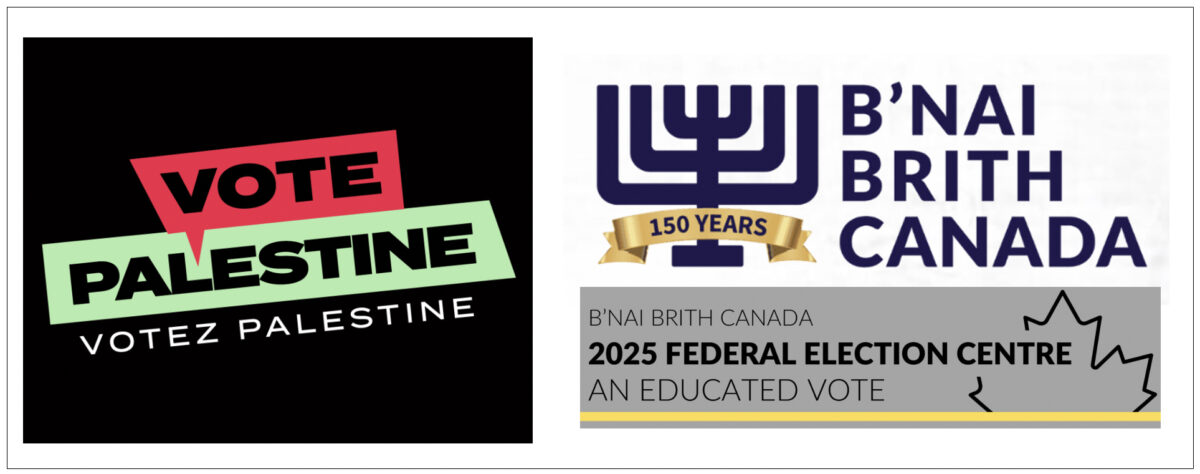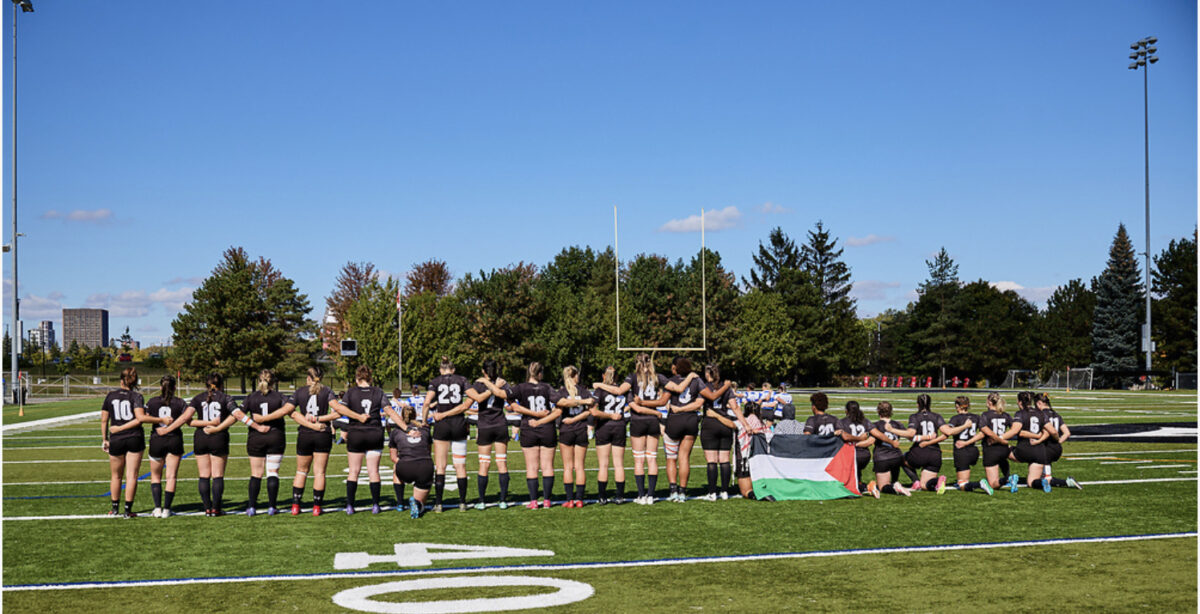As Canadians head into the final 10 days of campaigning ahead of the April 28 federal election, a pro-Palestinian advocacy group and B’nai Brith Canada — the leading voice of the country’s Jewish-Canadian community — are attempting to shape the discussion around the Israel-Hamas conflict and the humanitarian crisis in Gaza.
Vote Palestine says its “goal is to pressure all political parties and candidates to support Palestinian human rights.” B’nai Brith says its “2025 Election Centre” resource is designed to “help Jewish voters make an informed decision” and includes statements from federal parties “about their positions on issues that matter to Canadian Jewry.”
Each group is focused on the nature of the protests happening in Canada around the Middle East conflict.
Vote Palestine is urging the parties to “protect the right to protest and speak out on Palestine without harassment, reprisals or criminalization.” B’nai Brith Canada is pressing parties to commit to banning “all rallies that promote hate speech, violence, and extremism, including those like Al-Quds Day” — held on March 23 this year — and which the group states “have consistently been platforms for spreading antisemitic rhetoric and extremist views.”

The Vote Palestine campaign is also urging federal candidates to support Palestinian rights by endorsing an arms embargo on Israel and recognition of a Palestinian state, while also demanding an end to “anti-Palestinian racism” in Canada along with a strengthened commitment to “protect pro-Palestine speech.”
Controversy around pro-Palestinian protests flared again April 12 when hundreds of demonstrators marched to Parliament Hill to denounce Israeli military attacks in Gaza and make Canada’s stance on the Middle East conflict a ballot box question in the upcoming federal election.
B’nai Brith’s election effort is largely focused on advocating for stronger measures against antisemitism and curbing what it calls “extremism” embedded in some pro-Palestinian protests in Canada.
The Israel-Palestine conflict is a long-standing and deeply rooted struggle over land, national identity and political sovereignty. It has resulted in multiple wars, ongoing violence and humanitarian crises.
The latest stage of the conflict began on Oct. 7, 2023, when Hamas terrorists launched an attack on Israel in which about 1,200 were killed and some 250 others were taken hostage.
In the 18 months since, Israeli military attacks on Hamas in Gaza have left more than 50,000 Palestinians dead, more than half women and children. More than 100,000 people have been injured in the attacks, according to Gaza health authorities.

The war has been one of the deadliest escalations of the Middle East conflict in decades. The battle has created global tensions, sparking pro-Palestinian and pro-Israeli protests around the world, including Canada.
Vote Palestine wants the parties to take clearer stances on the still-unfolding crisis and future solutions. The federal Liberal government has tried to walk a fine line on the Middle East conflict and has pushed for a two-state solution.
Sarah Lujetic a Carleton University student and Palestine supporter, said that while the government has attempted to stake out a middle ground in the conflict, it would be better to know more about candidates’ thoughts on the situation in Gaza.
“It would be nice to know where the people in the government stand instead of getting nothing at all,” says Lujetic. “I didn’t realize there was a Vote Palestine website, but I think that would be really helpful for people to be informed before going to vote.”
Lujetic said advocates who are presenting platforms on the conflict to influence candidates and voters are helping to inform people about what matters to them.
The Vote Palestine platform is described as a non-partisan campaign aimed at putting “Palestine on the ballot.”
The campaign calls for a two-way arms embargo on Israel and banning Canadian involvement in illegal Israeli settlements and banning financial investments. Organizers are also advocating for protection of free expression to protest Israeli actions, including boycotts, divestments, and sanctions (BDS) in support of the Palestinian cause.
The group has been coordinating activists across the country to pressure MPs, political parties and candidates to endorse the Palestine Platform.
The group says it believes “a growing majority of people in Canada refuses to accept the government’s complicity in genocide and this will impact who they support.”
B’nai Brith Canada’s election pages highlight the group’s seven-point plan to combat antisemitism, focusing on the need for an all-of-government approach to implement the International Holocaust Remembrance Alliance (IHRA) definition of antisemitism.
B’nai Brith calls for the national adoption and clear implementation of guidelines to ensure effective application of policies to combat antisemitism across federal, provincial and municipal levels. The platform also aims to empower Jewish citizens and allies to engage actively in the democratic process, the group says.
Jonah Fried, B’nai Brith’s communications director, said the organization hopes the platform will give Jewish voters the resources to make informed decisions.
“We have sent questions to all the major political parties to get a sense of their positions on issues of concern to Jewish voters,” says Fried.
In its invitation for federal political parties to state their positions, B’nai Brith called attention to the proliferation of what it called “hate rallies” that were “originally promoted by foreign governments hostile to Canada and to Israel” and which “often cross the line from legitimate political discourse into hate speech and incitement against Jews.”
In its response to B’nai Brith Canada’s election questionnaire, the Conservative Party of Canada condemned “deplorable hate fests” and stated: “We will stand firm against terrorism, support our democratic ally, the State of Israel, and rebuild the relationship that the Liberals have damaged over the past decade.”
The Liberal party stated: “Antisemitism has no place in Canada, and we are concerned about the rise we have seen in this phenomenon since October 7, 2023.”
The Bloc Québécois emphasized the importance of “maintaining a healthy and democratic debate on the Israeli-Palestinian conflict.”
The Green Party’s response said: “We are committed to protecting Canadians from hate-fueled events and preventing rallies that support terror entities and sanctioned regimes. We will strengthen laws against hate speech and extremist gatherings while upholding democratic freedoms.
As of April 16, no responses from the NDP were posted at B’nai Brith Canada’s election site.




